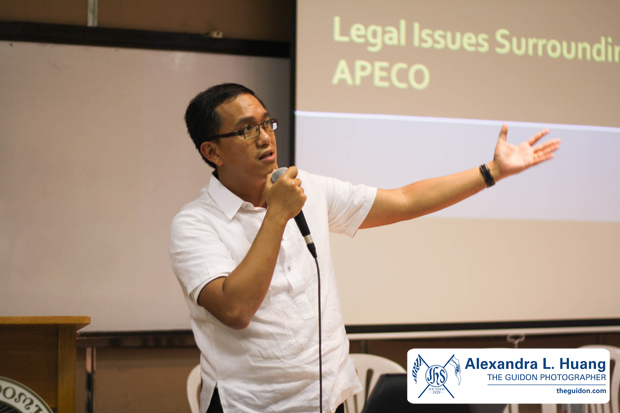CASIGURAN FARMERS, together with fisherfolk, once again visited the Ateneo. This time, it was to tell their struggle against the Aurora Pacific Economic Zone and Freeport Authority (Apeco) to more students in the university.
During a talk held at the Ching Tan Room yesterday, September 21, they spoke to Ateneans about the “Underside of Economic Progress” purportedly brought about by Apeco. Student political party Christian Union for Socialist and Democratic Advancement (Crusada) organized the said event.
Last July 20, four farmers from Casiguran met with members of the Sanggunian Central Board to discuss possible ways that Ateneo could help to lobby for their cause.
Apeco started as a bill by Aurora Representative Juan Edgardo Angara and his father, Senator Edgardo Angara. Former president Gloria Macapagal-Arroyo signed it into law in June 2007. Upon completion, it would be a 12,983-hectare special economic zone (SEZ) and would be the third largest SEZ in the country after Subic and Clark.
However, the land and livelihoods of at least 2,983 farmers, fisherfolk, and indigenous peoples—some of whom have lived there for over 50 years—are seen to be threatened by Apeco.
“Hindi po nakonsulta ang mga mamamayan tungkol sa proyektong ito. (Members of our community were not consulted about this project),” reiterated Elmer Gonzales, president of the Bicolano Ilocano Casiguran Farmers Association.
Gonzales added that this lack of consultations on the part of the Angaras constitutes a violation of the indigenous peoples’ right to “free, prior, and informed consent” to such construction of an SEZ, as stated in the 1998 Indigenous Peoples Rights Act.
Furthermore, Gonzales stated that the land involved is at present very rich, fertile and congenial to agriculture. The construction of Apeco, he said, explicitly disregarded a provision under the Comprehensive Agrarian Reform Program Law which prohibits irrigated and irrigable prime agricultural lands to be subjected to conversion.
Estimates of the damages amount to a loss of 5,611 metric tons of rice field. “Napakalaking pinsala sa kalikasan (A very huge damage to nature),” he added.
Apeco is said to improve the living conditions of the natives as one of its goals. Jerik Cruz of the Task Force Anti-Apeco, however, pointed out a gaping hole in this, saying that “Since 2007, already 28 families of fisherfolk have been evicted from their homes, after more than 5 years they have still not been given proper relocation. You would think that if they were really committed toward guaranteeing that they would be properly relocated, they would have a housing project by now. Apparently that’s not the case.”
Developing the region is also said to generate more jobs for the residents of Aurora. Hansley Juliano, however, remarked that the minimum educational attainment of those who are affected results to such a flawed assumption.
Atty. Aison Garcia of the Department of Agrarian Reform was the last speaker, explaining the legal aspect of the issue. “Article XII of the 1987 Constitution says that the use of property bears a social function and all economic agents shall contribute to the common good—not just the personal good, but the common good,” he stressed in a mix of Filipino and English.
In light of the cited anomalies and suspicious dynamic behind the construction of Apeco, Garcia emphasized that no disobedience of the Philippine Constitution should be condoned.




